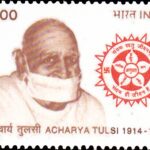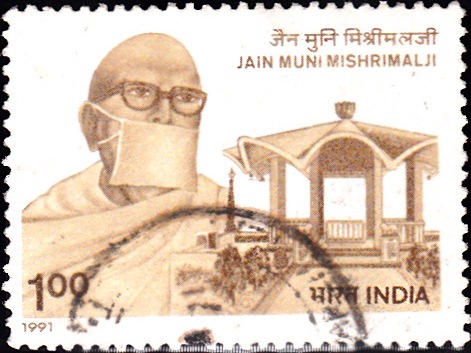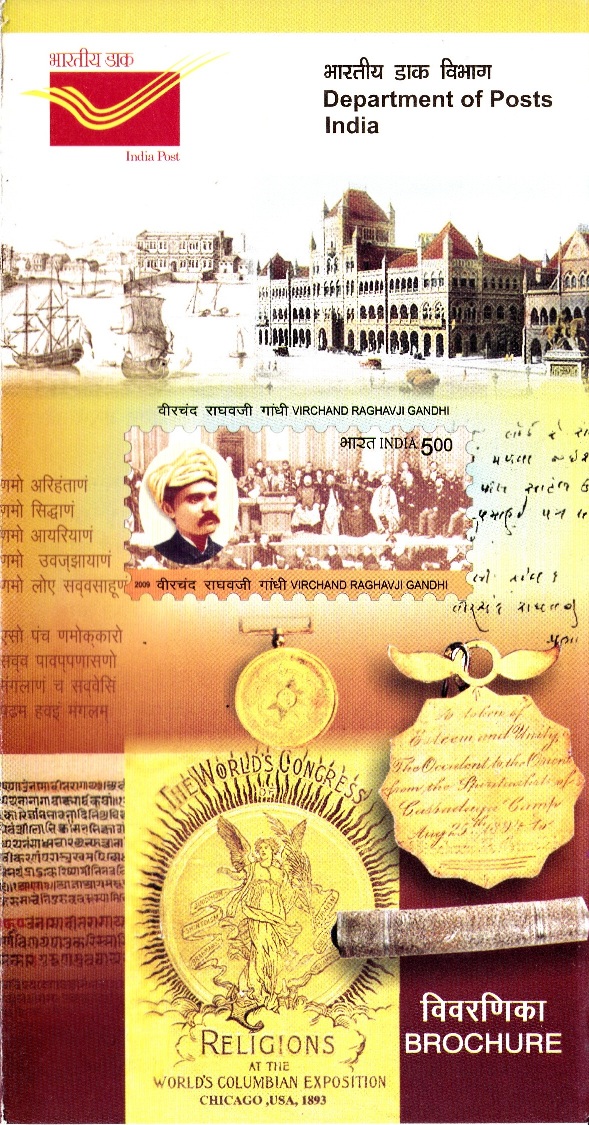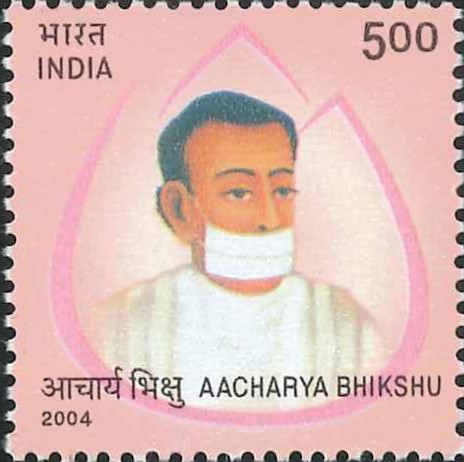
Acharya Bhikshu
A commemorative postage stamp on Aacharya Shri Bhikshu, founder and first spiritual head of the Svetambar Terapanth sect of Jainism :

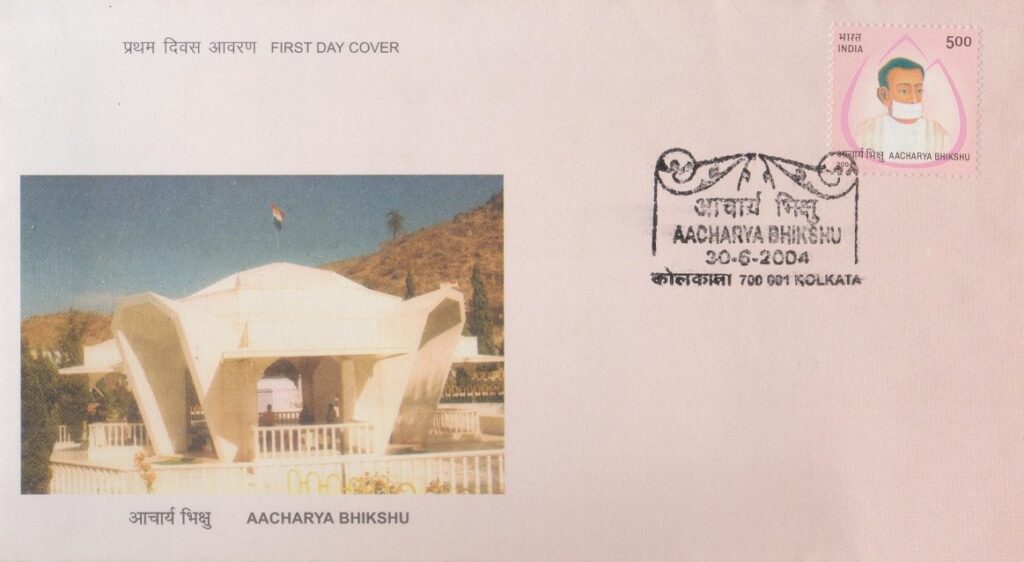
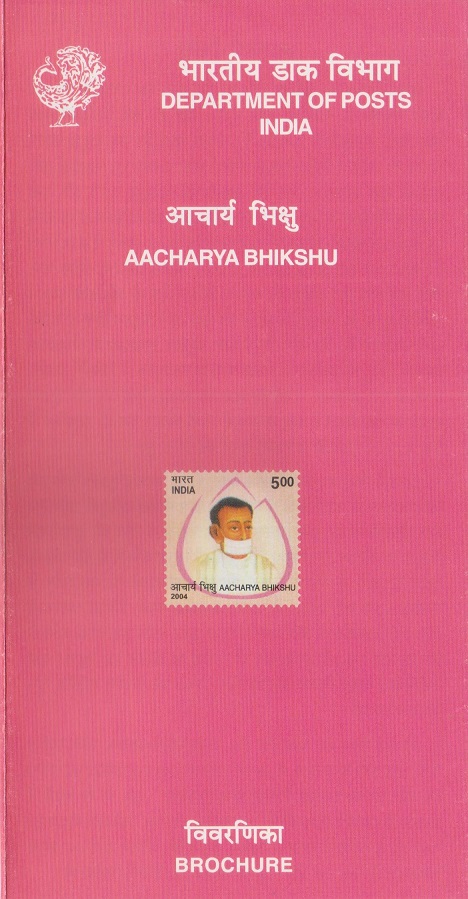 Issued by India
Issued by India
Issued on Jun 30, 2004
Design :
FDC : Aacharya Bhikshu‘s Samadhi Sthal at Siriyari, district Pali, Rajasthan.
Credits :
Stamp, FDC & Cancellation : Alka Sharma
Type : Stamp, Mint Condition
Colour : Multicolor
Denomination : 500 Paise
Stamps Printed : 0.4 Million
Number of Stamps per sheet : 48
Printing Process : Photogravure
Printer : India Security Press, Nashik
Name : Bhikhan ji
Born on Jul 1, 1726 at Kantaliya, Rajasthan, India
Died on Aug, 1803 at Siriyari, Pali district, Rajasthan, India
About :
- Religious history across the globe stands testimony to the fact that whenever religious decadence is rife in society, it leads to intellectual and socio-cultural turmoil. It makes thinking men and women question the ceremonial complexities and the precedence that the outer forms of religion often gain over the fundamental tenets and the basic purpose of religion – the cleansing of the mind and spirit and the attainment of purity of heart for placing them at the service of humanity. Christianity, Islam, Confucianism, Sikhism, Buddhism and Jainism are all instances of some of the great faiths of the world that arose as a reaction to religious obscurantism and with religious reform as the professed objective. The founder of the Jain Swetamber Terapanth Sect, Aacharya Bhikshu was also a man of revolutionary ideas who was propelled to react after he made an intense study of ancient texts and became acutely aware of not only their misinterpretation, but also the distorted version of religion prevalent in society.
- Aacharya Bhikshu was born to Shah Balluji Saklecha and Deepanji on the thirteenth day of the waxing moon in the month of Ashad in the Vikram Samvat year 1783, in the village of Kantaliya in Pali district, Rajasthan. He was married to Sugannibai of the neighbouring village but due to the sudden demise of his father and wife in quick succession, he took to ascetic life under the guidance of Aacharya Raghunathji. He set out from the village of Bagadi expressing his disenchantment with conservative fundamentalists, false beliefs and blind faith and reached Kelba in Mewar, Rajasthan. There he took a vow and established the Terapanth religious Sangha on June 28, 1760.
- Aacharya Bhikshu was a philosopher saint, perceptive writer, sensitive poet and social reformer. He composed about 38000 shlokas and his writings have been compiled in two volumes as “Bhikshu Granth Ratnakar“. Among his compositions, “Nav Padarth Sadbhav“, is regarded as a significant philosophical composition that deals exhaustively with the nine gems of Jain philosophy. It advocated a society free of exploitation.
- Aacharya Bhikshu was the harbinger of a religious revolution and he plodded to rid society of several evils. Gainful insights can be obtained in the field of governance, sociology and economics from the teachings of Aacharya Bhikshu. He advocated strongly the purity of means in achieving the goal. He said neither the fear of punishment nor the temptation of reward can make a religion work. For this a transformation of the heart is essential. He believed that violence committed out of necessity is also violence and quelling weaker beings for the gain of bigger ones was not acceptable to him. He gave to the world knowledge about the different premises of religion and society. He said wherever there is goodness and truth, it is conducive, irrespective of caste, creed or place to the well-being of the society. Help rendered to the suffering, exploited and helpless was labeled by him as duty, responsibility and social obligation; he gave the clarion call for a revolution in society.
- Aacharya Bhikshu attained eternal bliss in the Vikram Samvat year 1860 at Siriyari, Rajasthan. However, his teachings have been carried forward by Acharya Mahaprajna, the tenth Acharya of the Sangha, whose ‘Jeevan Vigyan‘ is an invaluable elucidation of the system of meditation. He meditated deeply to revive the ‘Preksha Dhyan‘ found to be useful in many problems like stress, addiction and other emotional, mental and physical problems. Contemporary Terapanth philosophy upholds and furthers the teachings of Aacharya Bhikshu that are centered around humanitarianism, secularism and peace. The Department of Posts is proud to associate itself with these values through the release of a commemorative postage stamp on Aacharya Bhikshu.
- Text : Based on material given by the proponent.
Subscribe
Login
0 Comments
Oldest


